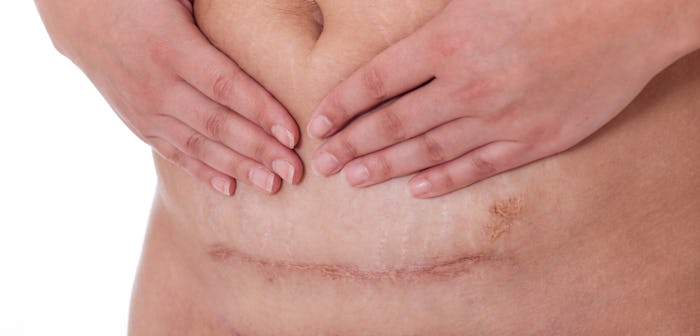Having a caesarian section is unique major surgery. Like other surgeries, it requires weeks for your body to fully heal, but unlike other surgeries, it is followed by your immediate need to suddenly care for a helpless other person. It's as if you had to return to work the day after a getting your gallbladder out. You may feel overwhelmed, but there are ways to recover faster from your c-section while still giving yourself time to heal.
The strategies to recover from a C-Section center on several theories:
- It's important to get your body moving as soon as possible
- It's important to rest as much as possible (yes, that seems to contradict #1).
- It's important to protect your incision so that it can heal properly.
- It's important to put the right foods in your body, including lots of water and healthy, well-rounded meals.
Be gentle with yourself and know that while you're probably eager to heal as soon as possible, your body has just been through a giant physical trauma. It's okay for you to take a while to get back to full-strength and ability, physically and mentally. As moms we often want to do everything for everyone but for the first few weeks, it's important to know when to ask for help and that no miracle is going to suddenly restore your body. However, there are a few things you can do to try to guide yourself toward that goal.
1Accept Help
As much as you think you can do it yourself, you can't. Right after surgery and even for the first few weeks, it's important to have help. Take advantage of eager grandparents, other family members, the baby's older siblings, your neighbor, your best friends, and your partner, to limit the times you need to get up and down and to help with the heavy lifting. If you don't have family members nearby, try to hire a doula or even a teen who can be a mother's helper. American Pregnancy suggests organizing a support team before you give birth. This will be useful whether you have a C-section or vaginal birth.
2Take The Pain Meds
After your C-section, you are going to be in pain. While you are in the hospital, the nurses will administer pain medication to you, first via intravenous line and later orally. Let them know if you are nursing, so that they make sure that whatever drugs you are being given are safe to pass through your milk to your baby. While you may be hesitant to take the medication, it will actually help you produce milk better. According to Parents, reducing your pain helps your body to relax, which in turn, helps stimulate your milk production.
3Get Out Of Bed
As tempting as it is to stay in bed all day, starting on the first day after surgery, the nurses are going to try to get you out of bed. While you need to be careful not to strain your abdominal muscles, movement is important to get the blood flowing and start the healing. As reported on Fox News, “All processes in the body are sped up by exercise,” said Mary Beth Knight, a fitness expert in Cincinnati, Ohio and author of Strategies for the C-section Mom: A Complete Fitness, Nutrition, and Lifestyle Guide.
4Compression Socks
These socks aren't sexy, but neither are Deep Vein Thromboses (DVTs), blood clots that sometimes form after surgery if you aren't mobile enough. According to eMedTV, these clots can travel to your lungs and have serious consequences. Compression boots or compression socks squeeze your lower legs to get the blood flowing and prevent the clots from forming. This is another reason to start moving as soon as possible after your C-section.
5Drink Water And Eat Vegetables
According to Baby Center, it can take three to four days after a C-section for your bowels to start moving again. Being worried about that first bowel movement may cause you to "hold it in" which will only make matters worse. Dehydration also causes constipation and straining when going to the bathroom can impede your recovery. It's important to drink lots of water and eat lots of vegetables to get things going.
6Be Organized
Get a basket and fill it with all the vital supplies. This can include the TV remote, a novel, your phone, medication, water, and snacks. This minimizes the amount of times you get up and down, which is stressful to your abdominal muscles. If you are really prepared, you can cook and freeze dinners before you give birth. Or keep takeout menus in your basket of supplies.
7Go Downstairs Backward
Carefully going down the stairs backwards helps take the strain off of your healing abdominal muscles.
8Take Care Of That Incision
Limiting stress on your abdominal muscles also helps promote healing in your incision. The Mayo Clinic suggests holding your abdomen when you laugh, cough or sneeze. You can also protect your incision by not lifting anything heavier than your baby for several weeks.
9Breastfeed Lying Down
Another way to reduce the strain on your abdominal muscles is to carefully cradle your baby while laying on your side when nursing. According to La Leche League, you might want to try positioning your body in different ways or using a pillow or rolled up towel as a support.
Check out Romper's new video series, Romper's Doula Diaries:
Watch full episodes of Romper's Doula Diaries on Facebook Watch.
